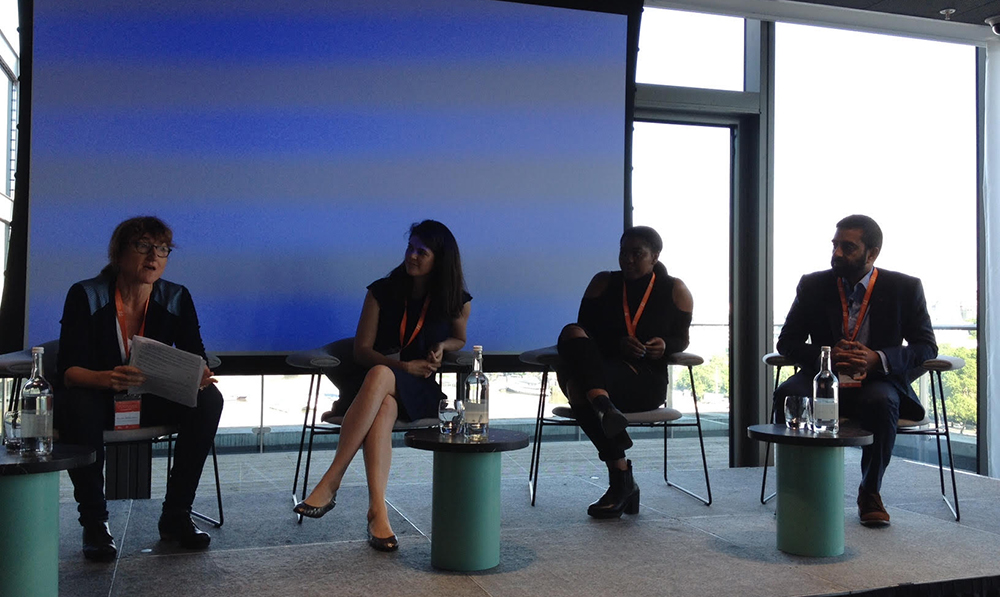Young people must be encouraged to adapt for digital future, experts say
Educators and employers must also rethink work culture in the new world of ‘streamed knowledge’

Britain's "stagnant" education system is not equipping young people to become good digital workers of the future, a panel of experts have said.
Young people need to be encouraged to have agency and taught to be adaptable if they are to thrive in the future jobs market, said panellists, including Baroness Beeban Kidron, investor Olivia Streatfeild and independent educator Benika Brown.
"Kids are inundated with technology, but not enabled by technology," said Baroness Kidron, founder of 5Rights and IntoFilm, organisations that help children and young people get involved with technology and film careers.
"They are being nudged into being passive consumers, or passive victims, of technology. So they're not going to be very good workers of the future they're not going to be filled with agency or be able to solve the problems that we're leaving for them.
"If we want digital workers we have to accept the idea of digital citizenship. And citizenship means having rights, as well as having responsibilities."
Baroness Kidron and her fellow panellists were speaking at a London Tech Week discussion about the future of work on Friday.
Artificial intelligence and robotics are changing the course of work, and there have been predictions that as many as five million people could be made redundant by 2020, because of how technology is transforming business.
Get the ITPro daily newsletter
Sign up today and you will receive a free copy of our Future Focus 2025 report - the leading guidance on AI, cybersecurity and other IT challenges as per 700+ senior executives
Benika Brown, co-founder of Shaping Tomorrow's Women, said educators must empower kids to take control of their learning.
"Robots can't be as creative as humans. We can see things beyond any software. We are people that created them. We need to get children in the mode of being creative, making new ideas and pushing the technology forward," she said.
"But because the school system is as stagnant as it is, children are at a disadvantage: computers are elevating before they are.
"It's about changing the system so children can control the technology when they are in a position to do so, rather than being controlled by it."
An out-dated school system, which "does not reflect the times we're living in", is also affecting things beyond how young people choose their first career or place of employment, the panel said.
Workplaces, too, must change, they said and established employment processes, such as representing talent and skills in the form of a CV, should change with it.
Gi Fernando, founder and group CEO of Freeformers, and organisation helping society and businesses with the digital transition said the model of knowledge storage, or knowledge banking, which much of education and business adhere to, is rapidly being replaced by a world of "streamed knowledge".
"The skills you need to work in a world of streamed knowledge are different to the skills you need to work in the world of stored knowledge. The speed at which you need to take streamed knowledge to apply it to something new or create something of value means a human needs to have a lot more resilience and courage in order to experiment and create," said Fernando.
"If we're not teaching that, then you have a real danger of inequality and separation."
Looking beyond entry-level jobs, and to young adults later in their careers, Baroness Kidron said we have "retreated from the ways of learning throughout life that has to be instituted in future. You actually have to learn things throughout your whole life".
"Our careers are non-linear and we're going to have to reinvent ourselves many times over. And those cycle times are getting, faster and faster," said Olivia Streatfeild, a partner at angel investment firm Freston Foundry.
Curiosity, confidence, challenge and a desire to continually improve are what Streatfeild recommended young people should be encouraged to think about in their career decisions.
Later, Streatfeild said that the biggest danger facing employees today is "lack of adaptability".
She suggests that there will have to be a cultural framework around technology in order to adapt people to the new methods of work.
-
 Cleo attack victim list grows as Hertz confirms customer data stolen
Cleo attack victim list grows as Hertz confirms customer data stolenNews Hertz has confirmed it suffered a data breach as a result of the Cleo zero-day vulnerability in late 2024, with the car rental giant warning that customer data was stolen.
By Ross Kelly
-
 Lateral moves in tech: Why leaders should support employee mobility
Lateral moves in tech: Why leaders should support employee mobilityIn-depth Encouraging staff to switch roles can have long-term benefits for skills in the tech sector
By Keri Allan
-
 Starmer bets big on AI to unlock public sector savings
Starmer bets big on AI to unlock public sector savingsNews AI adoption could be a major boon for the UK and save taxpayers billions, according to prime minister Keir Starmer.
By George Fitzmaurice
-
 UK government targets ‘startup’ mindset in AI funding overhaul
UK government targets ‘startup’ mindset in AI funding overhaulNews Public sector AI funding will be overhauled in the UK in a bid to simplify processes and push more projects into development.
By George Fitzmaurice
-
 UK government signs up Anthropic to improve public services
UK government signs up Anthropic to improve public servicesNews The UK government has signed a memorandum of understanding with Anthropic to explore how the company's Claude AI assistant could be used to improve access to public services.
By Emma Woollacott
-
 US government urged to overhaul outdated technology
US government urged to overhaul outdated technologyNews A review from the US Government Accountability Office (GAO) has found legacy technology and outdated IT systems are negatively impacting efficiency.
By George Fitzmaurice
-
 Government urged to improve tech procurement practices
Government urged to improve tech procurement practicesNews The National Audit Office highlighted wasted money and a lack of progress on major digital transformation programmes
By Emma Woollacott
-
 Government says new data bill will free up millions of hours of public sector time
Government says new data bill will free up millions of hours of public sector timeNews The UK government is proposing new data laws it says could free up millions of hours of police and NHS time every year and boost the UK economy by £10 billion.
By Emma Woollacott
-
 Three giant tech challenges the UK’s new government faces right now
Three giant tech challenges the UK’s new government faces right nowOpinion Five years starts now, and there’s not a second to waste
By Steve Ranger
-
 G-Cloud 13: UK government 'inhibiting' cloud SMEs' ability to adapt to harsher business landscape
G-Cloud 13: UK government 'inhibiting' cloud SMEs' ability to adapt to harsher business landscapeNews Suppliers on the cloud services portal have hit out at an extension to the current iteration of G-Cloud
By Ross Kelly